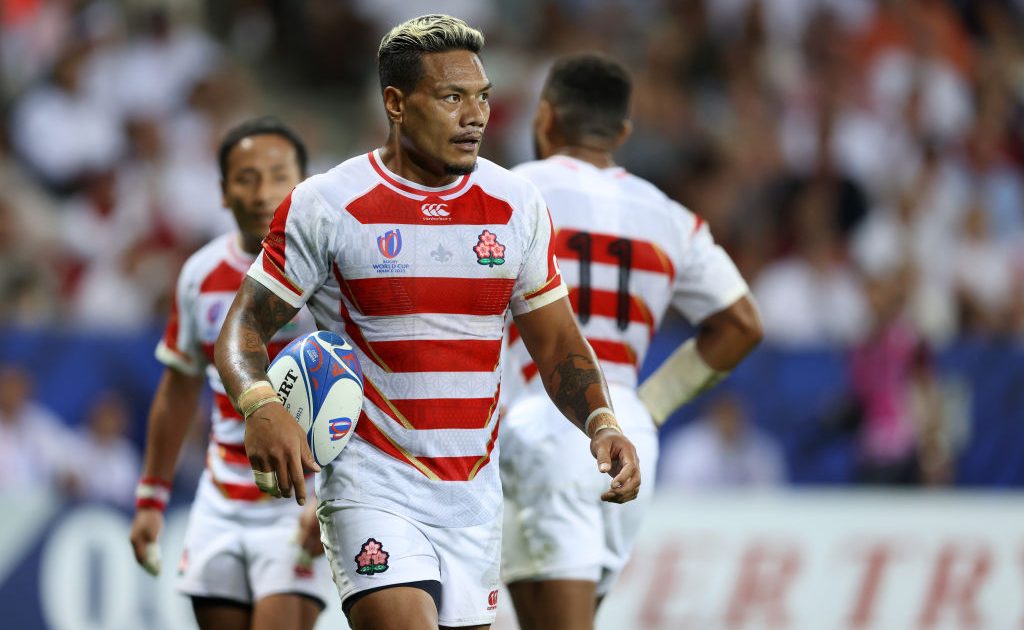Ce qu'il faut savoir sur le match Japon - Samoa

Les enjeux seront nombreux lors de la confrontation entre le Japon et les Samoa au Stadium de Toulouse, jeudi. Les deux équipes visent la qualification en quarts de finale dans une Poule D serrée, où un seul point sépare le deuxième du quatrième et où trois nations peuvent rêver des quarts.
Le Japon et les Samoa comptent tous deux une victoire, une défaite et cinq points en deux matchs, les Samoa étant deuxièmes à la différence de points.
Jamie Joseph, le sélectionneur du Japon, a apporté deux changements dans son XV de départ après la défaite 34-12 contre l’Angleterre. Dylan Riley remplace Tomoki Osada au centre et Lomano Lemeki remplace Semisi Masiresa à l’arrière.
Son homologue Seilala Mapusua a, quant à lui, effectué quatre changements au sein de son XV titulaire après la défaite 19-10 contre l’Argentine. Taleni Seu entre en troisième ligne après 26 minutes de haut vol en sortie de banc la semaine passée. Sa Jordan Taufua remplace Steven Luatua en 8, Alai D’Angelo Leuila épaulera Tumua Manu au centre, et Ed Fidow remplace Nigel Ah-Wong à l’aile.
Pour autant, les deux équipes n’ont pas totalement leur destin en main. L’Argentine, qui a un point de moins et qui occupe actuellement la troisième place de la Poule D, ne voudra pas manquer les quarts de finale une deuxième fois de rang.
Compte tenu de la course acharnée qui se joue pour la deuxième place derrière l’Angleterre, qui n’a pas encore validé sa place pour les quarts de finale, la troisième place, automatiquement qualificative pour la Coupe du Monde de Rugby 2027 en Australie, revêt une importance d’autant plus importante.
HISTORIQUE
Les Samoa ont remporté 13 de leurs 17 précédentes confrontations contre le Japon, dont un 24-22 à Sapporo il y a deux mois. Le Japon, en revanche, a gagné les trois matchs précédents, dont des matchs de poule lors des deux dernières éditions de la Coupe du Monde de Rugby.
MATCH MARQUANT
Il y a quatre ans – à une semaine près – le Japon battait les Samoa 38-19 à Toyota pour s’emparer de la tête de la Poule A et quasiment valider sa qualification en quart de finale de la Coupe du Monde de Rugby 2019 après trois matchs. Deux essais tardifs, de Kenki Fukuoka et Kotaro Matsushima, leur ont permis de décrocher un succès bonifié devant un stade en feu.
POINT-CLÉ
Des calculs qui donnent le tournis. La Poule D est plus qu’indécise. L’Angleterre, avec trois succès en trois matchs, n’est pas encore qualifiée. Les Samoa, le Japon et l’Argentine sont en embuscade avant ce match. Le Japon a perdu contre l’Angleterre mais doit encore rencontre l’Argentine. Les Samoa ont perdu contre l’Argentine, mais doivent encore affronter l’Angleterre. Ce match permettra à l’une des deux équipes de prendre une place aux deux autres.
LE DUEL
Shota Horie contre Seilala Lam. L’expérience aura un rôle à jouer en première ligne, et le Japonais Horie, avec quatre Coupes du Monde de Rugby à son actif, n’en manque pas. Face à lui, Lam dispute sa deuxième Coupe du Monde et s’est montré à son avantage contre l’Argentine.
LA STAT INCROYABLE
En 2015, le Japon est devenu la première équipe comptant trois victoires en phase de poule de Coupe du Monde de Rugby à se faire éliminer avant les quarts. Ils ont finalement réussi cette mission quatre ans plus tard, à domicile, en finissant en tête de la Poule A grâce à des succès contre la Russie, les Samoa, l’Irlande et l’Écosse.
L’ARBITRE
Jaco Peyper (Afrique du Sud). Avis aux entraîneurs de la défense : Peyper a, en cette Coupe du Monde de Rugby, pénalisé la défense à 27 reprises, contre 12 coups de sifflet contre l’équipe qui attaque.
LES ÉQUIPES
JAPON Lomano Lemeki ; Kotaro Matsushima, Dylan Riley, Ryoto Nakamura, Jone Naikabula ; Rikiya Matsuda, Yutaka Nagare ; Keita Inagaki, Shota Horie, Jiwon Gu ; Jack Cornelsen, Amato Fakatava ; Michael Leitch, Pieter Labuschagne, Kazuki Himeno (capitaine)
Remplaçants : Atsushi Sakate, Craig Millar, Asaeli Ai Valu, Warner Dearns, Kanji Shimokawa, Naoto Saito, Seungsin Lee, Tomoki Osada
SAMOA Duncan Paia’aua ; Ed Fidow, Tumua Manu, Alai D’Angelo Leuila, Ben Lam ; Christian Leali’ifano, Jonathan Taumateine ; James Lay, Seilala Lam, Paul Alo-Emile ; Chris Vui (capitaine), Theo McFarland ; Taleni Junior Agaese Seu, Fritz Lee, Sa Jordan Taufua
Remplaçants : Sama Malolo, Jordan Lay, Michael Alaalatoa, Steven Luatua, Alamanda Motuga, Melani Matavao, Neria Fomai, Danny Toala




